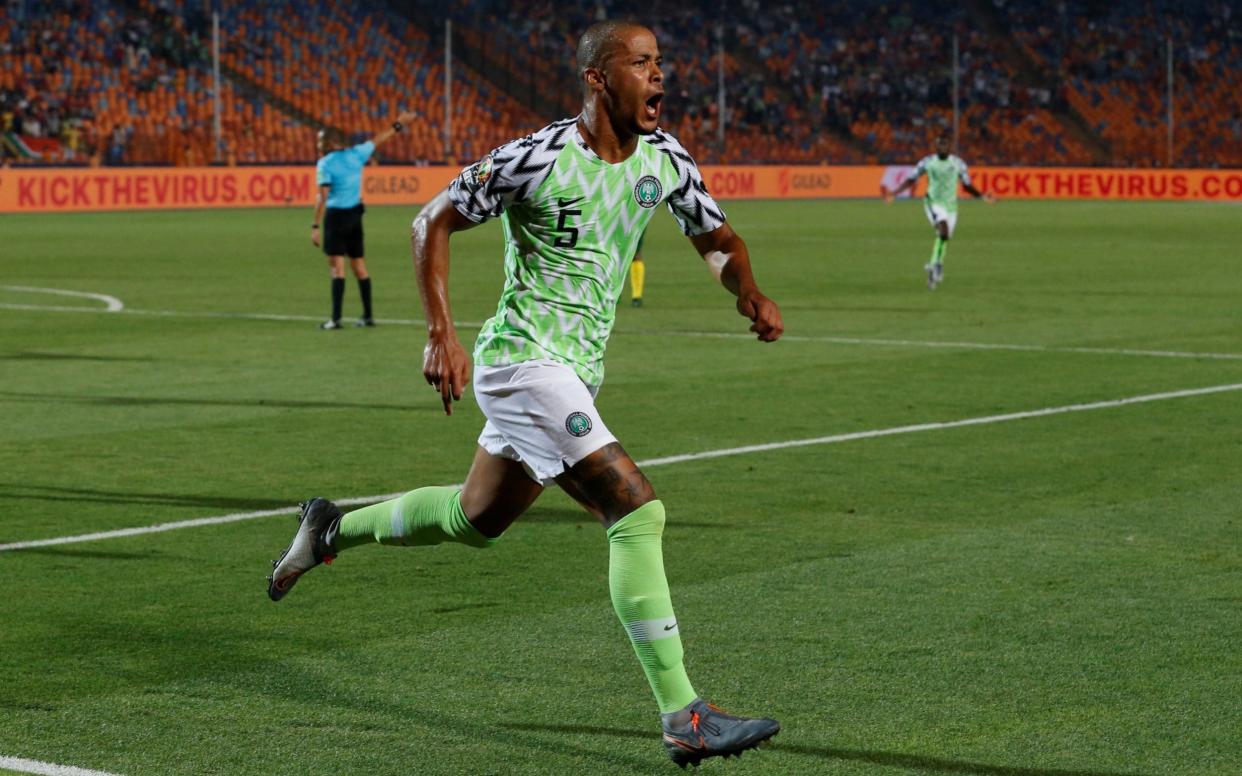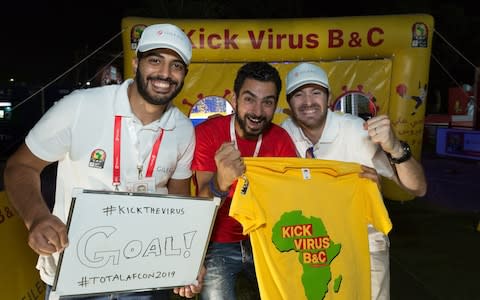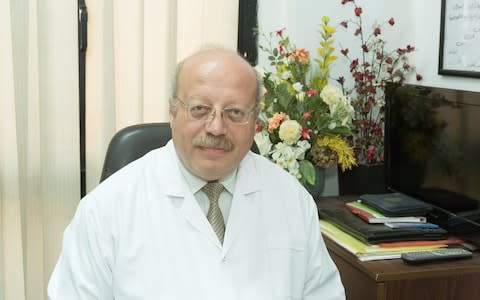A 'silent killer': how the African Cup of Nations is taking on viral hepatitis

There was a party atmosphere underneath the floodlights in Cairo’s 75,000-seat stadium last week, as fans clad in yellow and green welcomed their teams with a wall of noise.
It was a big match – Nigeria, in their jazzy fluorescent kit, were taking on South Africa in the quarter finals of the African Cup of Nations. Though the stadium was only two thirds full, vuvuzelas, trumpets and chants provided an unrelenting soundtrack for the 90 minutes of football, as the two teams vied for a spot in the semis.
This summer all eyes are on Egypt, where Africa’s biggest and most popular sports tournament is being held. Over four weeks, 24 teams are battling it out in 52 matches – all are hoping to be crowned champions. Tonight either Senegal or Algeria will take home the title.
Football is one of the few unifying forces in a vast, diverse continent where some 2,000 languages are spoken – in 2017, more than 400 million people tuned in to watch the cup on TV, a figure expected to be dwarfed this year.
But for the first time, organisers are taking advantage of this huge platform to share a public health message: get tested for hepatitis B and C, both “silent killers”.
“In Africa, football is the only sport that speaks to everybody, that speaks to all cultures,” says Idriss Akki, president of African football at Lagarde Sport – the marketing agency which has helped organise the tournament for more than a decade.

“Africa does not have all the same languages, the same religions, the same traditions, but we all have football. And sport, it is the only thing that people still want to watch live, with family and with friends,” he adds. “So this is a special way to share a live-saving message.”
The campaign, ‘Kick the virus’, is led by the US pharmaceutical company Gilead Sciences, which has sponsored the competition. Throughout the tournament, a message to ‘Kick virus B & C’ is displayed periodically in English, French and Arabic on the advertising ticker surrounding the football pitch – and from there it is broadcast to millions.
“Viral hepatitis in Africa is a very big public health problem, but less than eight per cent of people who have hepatitis B know they have it. If you take hepatitis C, less than 10 per cent know,” says Dr Papa Salif Sow, vice president of access operations and emerging markets in Africa at Gilead.
“What is lacking is awareness – people don’t know about the virus, don’t know to get tested. How can we treat people who don’t know they have a disease? That’s where the African Cup of Nations comes in".

Viral hepatitis is an infection that causes liver inflammation and damage, and often progresses to liver cancer, scarring or cirrhosis. In 2015 it caused roughly 1.34 million deaths across the globe – more than HIV or malaria – and although there are five strains, hepatitis B and C were responsible for 96 per cent of all deaths.
Hepatitis B, by far the more common, is typically transmitted from mother to child during birth and delivery, but can also be contracted through contact with blood or other body fluids – for instance during sex. Hepatitis C is only transmitted through exposure to blood, sometimes in tiny quantities.
Both viruses are complicated and difficult to identify. Mild symptoms including fatigue, fever and jaundice can emerge within weeks of the infection, in the acute phase of the illness, and usually resolve on their own.
But in many cases, hepatitis B and C become chronic – there are no symptoms for years and by the time warning signs emerge it’s too late, the liver is damaged and the virus has progressed to cancer or cirrhosis.
Yet the availability of both a vaccine, which protects against viral hepatitis B, and effective direct-acting antivirals, which can cure hepatitis C, led the World Health Organization to set an ambitious goal of eliminating the disease by 2030.

Tournament host Egypt, who were unexpectedly knocked out of the Cup of Nations by South Africa, is one of the few countries set reach these WHO targets.
A mass campaign to tackle the disease schistosomiasis between 1960 and 1980 left millions with hepatitis C, as poor medical practices meant infected needles were unwittingly used to inject people with treatment for the parasitic illness. By the turn of the century, one disease had replaced another; 15 per cent of the population had hepatitis.
In 2006, the government finally acknowledged the problem, says Dr Gamal Esmat, professor of hepatology and endemic medicine at Cairo University, and a leading force behind efforts to tackle hepatitis in Egypt.
But poor treatment options meant progress was slow until Egypt struck a deal with Gilead, which had patented the first direct-acting antivirals in 2013, to buy the lifesaving drugs at an enormously reduced price.
The pharmaceutical company sells drugs which cost tens of thousands of dollars per treatment in places like the UK or US – a price that has been criticised by groups including the US Senate Finance Committee for “placing profits before patients” – for roughly $50.
“Everything changed after that,” says Dr Esmat, likening the deal to that which Nelson Mandela negotiated with pharmaceutical companies to reduce the price of HIV antivirals in South Africa in the late 1990s.
“The direct-acting antivirals are suitable for about 95 per cent of patients, it’s cured about 95 per cent of patients. So by the end of July 2016, we had treated all those who knew they had viral hepatitis C infections – we treated maybe two million people,” adds Dr Esmat, sitting in a small office in the heart of bustling Cairo.

But the battle was not over – estimates suggested that there were millions more people in Egypt with hepatitis C. The country has since started the world’s largest hepatitis C screening campaign, testing more than 50 million people through a network of health clinics, and a treating another one million people with the direct-acting antivirals.
“Egypt is probably the best example we have around the world, just by the sheer size of what has been accomplished,” says Dr Akram Bouchenaki, director of access operations and emerging markets in North and West Africa at Gilead . “In Egypt any taxi driver will tell you about hepatitis C like it’s a normal conversation, everybody will. It shows awareness really working at the broadest level.”
Abdul Atti, an Egypt fan now throwing his support behind Algeria in the Cup of Nations – “not even Mo Salah could save us,” he laments – received treatment for hepatitis C in the nick of time.
The 59 year old has known about his viral infection for 17 years, after blood tests for an unrelated problem identified the disease. But Mr Atti was one of the many thousands deemed a ‘non-responder’ to treatment – the complicated, gruelling injection regime previously used to treat hepatitis C, which only cured half of patients, did not work.
His fate was thought to be sealed – his liver was left to slowly deteriorate.

But in 2015, Mr Atti received the direct-acting antivirals – the first drugs ever created which cure, rather than suppress, a virus. After taking tablets every day for 12 weeks, he was rid of hepatitis C.
“I had no symptoms so I was fortunate to find out I had the virus,” he said, sitting in a white tiled health clinic in downtown Cairo. “But I thought it would kill me. I still can’t believe it’s gone.”
Back across town, the energetic crowd went wild as William Troost-Ekong scored a dramatic late winner, securing a 2-1 victory for Nigeria and a spot in the semi-finals. A week later, the West African team went on to place third for the eight time in the competition, beating Tunisia in the play-offs.
And as all the action continues, with goals, tackles and upsets galore broadcast to the world, there's an animation playing on the advertising board with an important message: ‘kick the virus’.
Protect yourself and your family by learning more about Global Health Security

